Advanced electrode boilers dramatically reduce the risk of explosion, fire, and noxious emissions associated with fossil fuel burning units In industry, gas-fired boilers have largely been the standard for many decades to produce steam as well as heat process water. However, not all boilers are created equal in terms of safety. By definition, combustion-fueled boilers Read more
Vice President
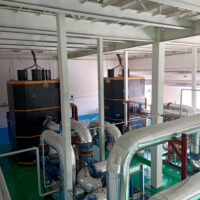
Advanced electrode boilers dramatically reduce the risk of explosion, fire, and noxious emissions associated with fossil fuel burning units
In industry, gas-fired boilers have largely been the standard for many decades to produce steam as well as heat process water. However, not all boilers are created equal in terms of safety. By definition, combustion-fueled boilers can emit harmful vapors, leak gas, and even cause explosions and fires.
In a recent example, a natural gas boiler was cited as the cause of a massive explosion and fire at a food processing plant in eastern Oregon that injured six and caused severe damage to the facility’s main building. Given the risks, many processors are turning to a new generation of electric boilers to dramatically reduce these hazards.
“With gas burning boilers, any gas leak can increase the risk of an explosion wherever there are fuel lines, fumes, flames, or storage tanks. So, gas units must be continually monitored or periodically inspected,” says Robert Presser, Vice President of Acme Engineering Products, who notes that state and municipal safety guidelines vary depending on boiler type and the expected frequency of inspection. Acme Engineering is a North American manufacturer of boilers for large industrial and commercial applications. The company is an ISO 9001:2015 certified manufacturer of environmental controls and systems with integrated mechanical, electrical and electronic capabilities.
In gas-fired boilers, explosions can result in the ignition and instantaneous combustion of highly flammable gas, vapor, or dust that has accumulated in a boiler. The force of the explosion is often much greater than the boiler combustion chamber can withstand.
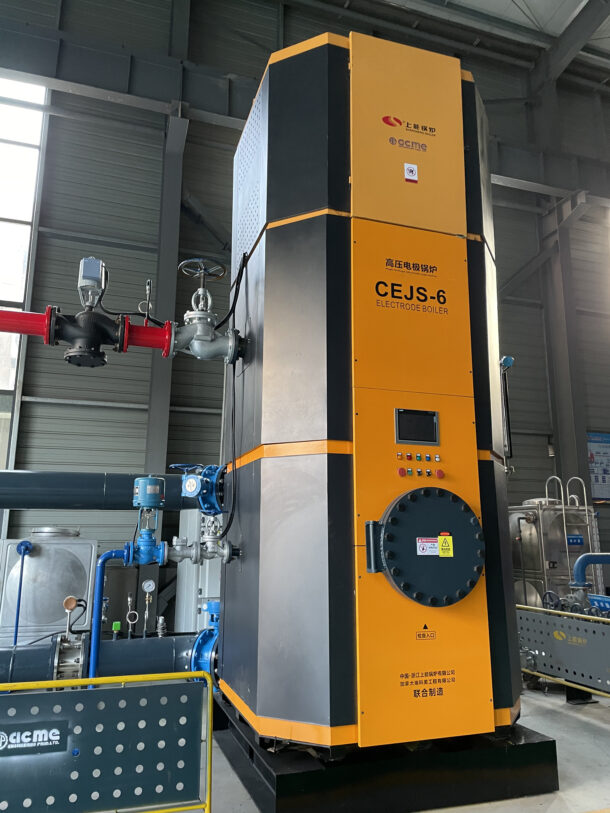
As safer, more energy-efficient electrode boilers become more widely available, companies can protect their people and processes more completely while minimizing required maintenance.
Minor explosions, known as flarebacks or blowbacks, can also suddenly blow flames many feet from firing doors and observation ports, seriously burning anyone in the path of a flame.
Natural gas-fired boiler emissions also pose potential hazards in the form of emissions. This can include nitrogen oxides (NOx), carbon monoxide (CO), nitrous oxide (N2O), volatile organic compounds (VOCs), sulfur dioxide (SO2), and particulate matter (PM), as well as the greenhouse gasses carbon dioxide (CO2) and methane (CH4), which accelerate global warming.
In addition, fossil fuel burning boilers can also face potentially dangerous operational issues stemming from excessive heat accumulation, particularly if the water is too low in the system to properly absorb the heat. High heat conditions can compromise the boiler, electrodes, and other equipment essential to operation.
To dramatically improve operator and environmental safety, industry is turning toward modern electric boilers that eliminate many of these risks. The most advanced electrode boilers not only match the capacity of large gas or oil-fired boilers but are safer and more compact, maximizing energy efficiency, improving reliability, and minimizing maintenance.
Although many facility engineers are familiar with gas-fired boilers, many believe that electric boilers cannot match the output of the traditional, fossil fuel burning units. Due to considerable advances in electric boiler technology, however, such technology can now match the capacity of large gas or oil-fired boilers in a much smaller footprint.
Presser explains that electric boilers utilize the conductive and resistive properties of water to carry electric current and generate steam. An A.C. current flows from an electrode of one phase to ground using the water as a conductor. Since chemicals in the water provide conductivity, the current flow generates heat directly in the water itself. The more current (amps) that flows, the more heat (BTUs) is generated, and the more steam produced.
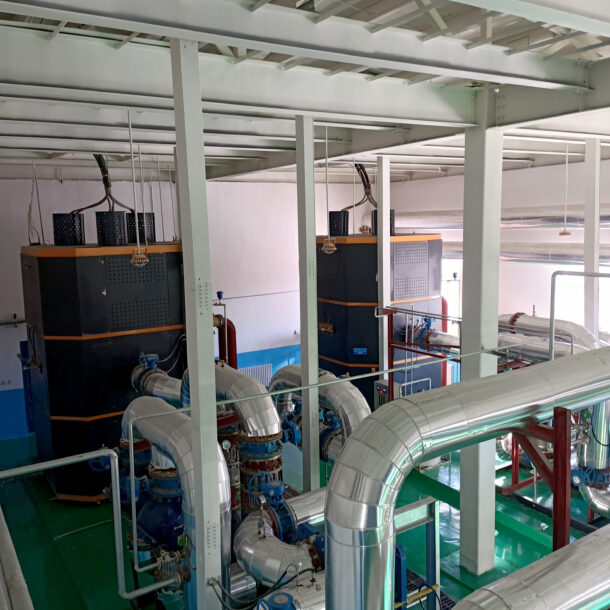
State-of-the-art electrode boilers are safer, more energy-efficient alternatives to gas burning units, and also have significant benefits in terms of reliability and maintenance.
As an example, in Acme’s CEJS High Voltage Electrode Steam Boiler, almost 100% of the electrical energy is converted into heat with no stack or heat transfer losses. The electrodes of the jet type electrode steam boiler are vertically mounted around the inside of the pressure vessel. This enables the unit to produce maximum amounts of steam in a minimum amount of floor space, with boiler capacity from 6MW to 52MW. Operating at existing distribution voltages, 4.16 to 25 KV with up to 99.9% efficiency, the boiler can produce up to 170,000 pounds of steam per hour. With pressure ratings from 105 psig to 500 psig, the boilers are designed to ASME Section 1, and are certified, registered pressure vessels at the location of the boiler.
“With the jet type electrode boilers, there are no combustion hazards because there are no flames, fumes, fuel lines or storage tanks, which minimizes the risk of explosions and fires,” says Presser. In case of an electrical short, the breaker that protects the high voltage circuit trips in a matter of milliseconds, protecting the boiler and the electrical network. There is no chance of electrical mishap or fire from the boiler.
Since the design does not rely on combustion, it does not create emissions that would endanger the operator or environment. In addition, the design eliminates many environmental issues associated with fuel burning boilers such as fuel fumes, fly ash, and large obtrusive exhaust stacks.
The approach resolves safety issues related to potentially excessive heat accumulation with the system as well. Low water protection is absolute since the absence of water prevents current from flowing and the electrode boiler from producing steam. Unlike conventional electric boilers or fossil fuel boilers, nothing in the electrode boiler is at a higher temperature than the water itself. This prevents the risk of dangerous heat build up in the boiler, electrodes, and other important components even if scaling should occur, and thermal shock is eliminated.
“Electric boilers, and specifically the electrode units, are inherently the safest boiler design today. These units do not need an operator because if anything goes wrong, the breaker trips, preventing further escalation of the issue,” explains Presser.
The electric boilers also improve safety by reducing industrial noise, which is an OSHA regulated issue. Under OSHA’s Noise Standard, the employer must lower noise exposure through engineering controls, administrative controls, or Hearing Protection Devices (HPDs) to attenuate the occupational noise received by the employee’s ears to within levels specified.
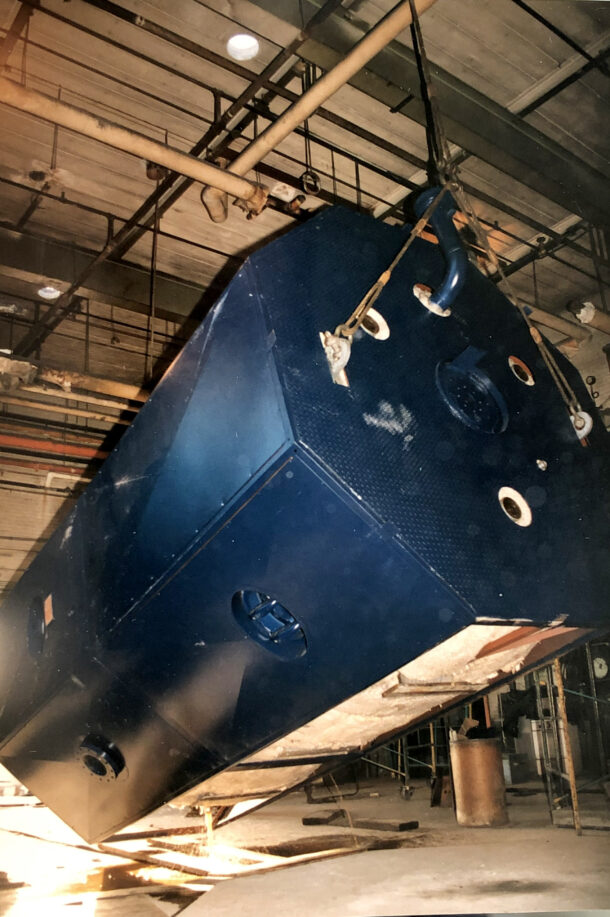
Advanced electrode boilers like those from Acme Engineering dramatically reduce the risk of explosion, fire, and noxious emissions associated with fossil fuel burning units.
In this regard, the electric units are also exceptionally quiet compared to fuel fired boilers. “Unlike gas-powered burners that throttle like turbine engines almost continually, electric boilers keep operational noise levels down,” says Presser. “Because the loudest boiler component is a circulating pump motor, you can have a conversation next to one without the need to elevate your voice.”
While safety of the electrode units is superior, there are also significant benefits in terms of reliability and maintenance. The absence of excessive temperatures and burnout assures longer operating life. The boilers have a minimum number of components and electrical controls. With no fuel residues, along with fewer parts and simple control systems, cleaning and maintenance requirements are reduced, and reliability is enhanced.
Processors have long sought to improve safety, yet options have been limited. Now, as safer, more energy-efficient alternatives become more widely available in the form of state-of-the-art electrode boilers, companies can protect their people and processes more completely while minimizing required maintenance.
For more info, contact Robert Presser at Acme Engineering at e-mail: rpresser@acmeprod.com, phone: 888 880-5323, or web: www.acmeprod.com/
Del Williams is a technical writer based in Torrance, California.

NIBCO INC. has announced the promotion of Dawn Bloch to vice president, customer engagement. In her new role, Bloch will oversee the marketing communications department in addition to continuing to manage business development and customer service. She will report to Ashley Martin, executive vice president, NIBCO. Bloch joined NIBCO in 2000 as a customer service representative Read more
NIBCO INC. has announced the promotion of Dawn Bloch to vice president, customer engagement.
In her new role, Bloch will oversee the marketing communications department in addition to continuing to manage business development and customer service. She will report to Ashley Martin, executive vice president, NIBCO.
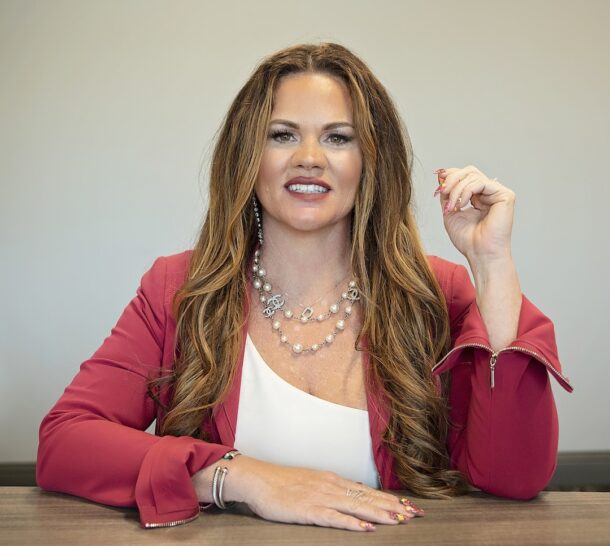
Bloch joined NIBCO in 2000 as a customer service representative. She held several positions of increasing responsibility including technical specialist, radiant heating advisor; radiant heat technical coordinator; customer service supervisor; customer service manager, director retail sales; manager, HR services; and director, business development and customer service.
Bloch was named to Supply House Times, “20 Women in Industry” in March 2017, an acknowledgement of women decision makers in the PHCP-PVC industry. At NIBCO, she was recognized in 2015 with the Rex Martin award, given to recognize achievement in cost reduction, safety, or an increase in sales, and in 2018, the Alice A. Martin award, given to recognize women who demonstrate philanthropy, community service, mentorship, and support the development of other women.
She has been a member of the American Supply Association Women in Industry since 2013, a board chair for Habitat for Humanity of Elkhart since 2019, and she volunteers for the United Way of Elkhart.
She holds a bachelor’s degree of Science in Business Administration from Indiana Tech, Fort Wayne, Indiana. Bloch also holds a master’s degree in Business Administration from the University of Northern Alabama and a certificate in Digital Marketing from Cornell University.
She resides in Elkhart, Indiana.

Bluon, Inc. the fast-growing company committed to bringing unparalleled innovation to the HVAC industry by empowering HVAC technicians, announced today the promotion of Drew Eckman to senior vice president. With this new appointment, Eckman officially joins Bluon’s senior management team and will lead the company’s sales team and overall go-to-market efforts. Eckman, who has been Read more
 Bluon, Inc. the fast-growing company committed to bringing unparalleled innovation to the HVAC industry by empowering HVAC technicians, announced today the promotion of Drew Eckman to senior vice president. With this new appointment, Eckman officially joins Bluon’s senior management team and will lead the company’s sales team and overall go-to-market efforts. Eckman, who has been with the company for over two years following a successful legal career, will work side by side with Bluon CEO Peter Capuciati, and COO Danica Bunnett to determine and navigate the company’s continuously evolving strategic plan.
Bluon, Inc. the fast-growing company committed to bringing unparalleled innovation to the HVAC industry by empowering HVAC technicians, announced today the promotion of Drew Eckman to senior vice president. With this new appointment, Eckman officially joins Bluon’s senior management team and will lead the company’s sales team and overall go-to-market efforts. Eckman, who has been with the company for over two years following a successful legal career, will work side by side with Bluon CEO Peter Capuciati, and COO Danica Bunnett to determine and navigate the company’s continuously evolving strategic plan.
As a corporate attorney for nearly a decade, Eckman specialized in mergers and acquisitions, joint ventures, private equity investments, and financing for high-growth startups.
“Drew is that unique individual who is fluent and has mastery in strategy, analysis, deal structuring, and most importantly, in human psychology,” said Peter Capuciati, chairman and CEO of Bluon, “All of these elements are critical when creating and executing a nuanced, go-to-market strategy like ours, enabling us to successfully launch an innovative e-commerce platform connecting 100,000 HVAC technicians with their local distributors”.
Danica Bunnett, COO, elaborated: “Drew has significantly upped his game at precisely the right time. We could not be doing what we are doing without him. As COO, there is nothing better than having 110% confidence in someone’s ability to execute an extremely nuanced strategy with precision and grace.”
“I am honored to take on a new role with a company I’m passionate about and build on everything we’ve accomplished under Peter and Danica’s leadership,” said Eckman. “I have the privilege of working with an insanely gifted team at Bluon committed to making a positive impact on the HVAC industry and the people within it. I look forward to helping the company grow more as we bring a game-changing technology to market that helps customers save time, optimize their workflows, and grow their businesses.”

Oatey Co., a leading manufacturer in the plumbing industry since 1916, has announced the promotion of Nicole Fournier to Vice President, Retail Business Unit. With nearly 20 years of experience in marketing and sales strategy, Fournier joined Oatey in 2019 as part of its acquisition of Keeney Mfg., where she worked for nearly 15 years Read more
 Oatey Co., a leading manufacturer in the plumbing industry since 1916, has announced the promotion of Nicole Fournier to Vice President, Retail Business Unit. With nearly 20 years of experience in marketing and sales strategy, Fournier joined Oatey in 2019 as part of its acquisition of Keeney Mfg., where she worked for nearly 15 years. During her tenure with Oatey and Keeney, Fournier has served in a variety of leadership positions supporting the retail business.
Oatey Co., a leading manufacturer in the plumbing industry since 1916, has announced the promotion of Nicole Fournier to Vice President, Retail Business Unit. With nearly 20 years of experience in marketing and sales strategy, Fournier joined Oatey in 2019 as part of its acquisition of Keeney Mfg., where she worked for nearly 15 years. During her tenure with Oatey and Keeney, Fournier has served in a variety of leadership positions supporting the retail business.
Most recently, Fournier served as Oatey’s Director, Retail Channel, accountable for leading new product development; establishing product, brand and positioning strategies in the retail market space; and supporting the retail sales teams. As Vice President, Retail Business Unit, Fournier will lead Oatey’s retail division, which also includes ongoing support for the Keeney brand. In addition to her continued responsibility for product and channel marketing, Fournier will now lead the retail sales function.
“Nicole’s extensive marketing and sales strategy background and significant experience with Oatey’s retail customers position her well to lead our retail business unit,” says Michelle Newland, President, Retail & International. “In addition, she is an influential leader with a unique ability to drive her internal team’s success. I am confident that her leadership will help Oatey continue to deliver the quality and partnership our customers have come to expect.”
